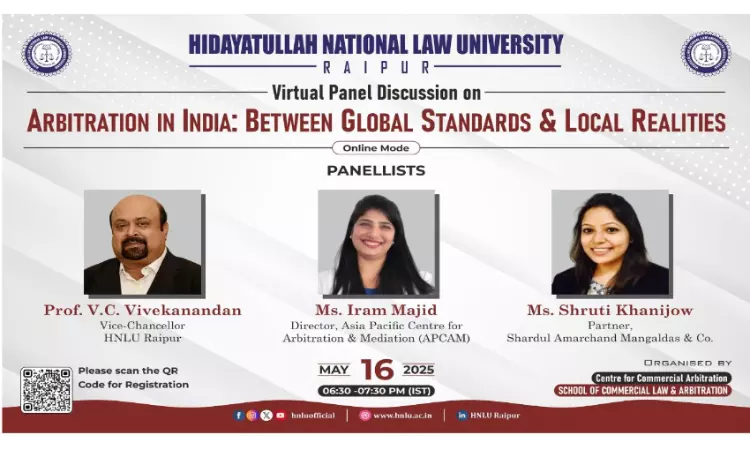HNLU Hosts Panel Discussion On 'Arbitration In India: Between Global Standards and Local Realities'
LIVELAW NEWS NETWORK
21 May 2025 9:19 AM IST

Hidayatullah National Law University (HNLU), through its Centre for Commercial Arbitration (CCA), convened a virtual panel discussion on the theme “Arbitration in India: Between Global Standards and Local Realities.” The event served as a forum for reflection and dialogue on India's evolving arbitration ecosystem, drawing participation from legal scholars, practitioners, and institutional leaders.
The discussion comes at a time when India is making concerted efforts to harmonise its arbitration regime with global benchmarks such as the UNCITRAL Model Law, while simultaneously navigating its unique institutional, procedural, and cultural contexts. Although judicial pronouncements by the Supreme Court and various High Courts have increasingly signalled a pro-arbitration stance, the path to achieving globally competitive arbitration practices remains complex and layered.
Prof. (Dr.) V. C. Vivekanandan, Vice Chancellor of HNLU, delivered the inaugural address, offering a wide-angled view of arbitration in India's legal and economic narrative. He remarked that despite India's transformative strides in digitalisation and economic liberalisation, the institutional architecture for arbitration continues to demand robust reform. Drawing comparisons with jurisdictions like London and Singapore, he noted that while these models provide valuable insight, India must innovate solutions grounded in its own legal traditions and socio-economic realities.
The panel featured two eminent experts:
* Ms. Iram Majid, Director of the Asia Pacific Centre for Arbitration & Mediation (APCAM), and
* Ms. Shruti V. Khanijow, Partner at Shardul Amarchand Mangaldas & Co.
The session was moderated by Dr. Amitesh Deshmukh, Head of the Centre for Commercial Arbitration. The programme was anchored by Ms. Astuti Dwivedi, student of HNLU and Closing remarks delivered by Mr. Mayank Srivastav, faculty of HNLU.
Ms. Iram Majid provided an institutional lens to the discussion, underscoring that the challenge in India lies not in legislative drafting—which has made substantial progress—but in the implementation of those frameworks. She made an argument for a shift away from the prevalent ad hoc arbitration culture towards a structured, institution-driven approach. According to her, the key to reform lies in cultivating a collaborative ecosystem in which arbitral institutions, the judiciary, legal professionals, and users work in synergy.
Ms. Shruti V. Khanijow, leveraging her experience in both domestic and international arbitrations, stressed the importance of differentiating between the needs of international commercial arbitration and domestic arbitration. She argued that each stream demands tailored strategies and reform priorities. She further highlighted the need to build an “arbitration culture” in India—one that extends beyond legal practitioners to include businesses, public sector entities, and dispute resolution users. This cultural orientation, she noted, is essential to build long-term trust and credibility in India's arbitration system.
The session emerged as a convergence of academic analysis, policy insight, and practical wisdom. With platforms such as the CCA and its expanding research initiatives, HNLU remains committed to nurturing a generation of legal minds equipped to contribute to India's rise as a credible and efficient seat of arbitration.


